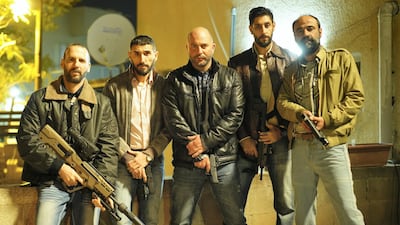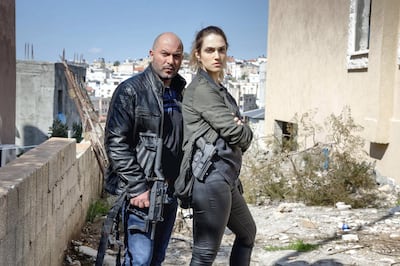Like many people during lockdown, I have found Netflix to be a useful escape from reality, which has now become a vast landscape of uncertainty.
In the last couple of weeks, I finished the third season of Fauda, an Israeli television series. But far from serving as a comforting balm, the series only left me even more agitated.
Fauda – chaos in English – has a storyline centred on the inner world of a tight-knit group of Israeli commandos known as the Mista'aravim, Arabic-speaking soldiers posing as Palestinians.
Fluent in the language and culture, they infiltrate Palestinian villages and families to root out militants. But their clumsy work often destroys innocent lives.
The level of gun violence is more akin to watching three solid hours of Call of Duty or Grand Theft Auto than a sophisticated thriller.
In one crucial scene, Nurit, the only woman in the commando unit, impersonates a French humanitarian worker to gain access to the Gaza Strip.
“Do you have children?” she innocently asks a crossing guard, handing over papers identifying her as an aid worker. “I’m delivering medication to children at Shifa Hospital.”
Nurit’s van bears the neutral emblem of humanitarians around the world: a red cross. But instead of bandages and medicine, it is loaded with an arsenal of weapons.
It is a violation of the Geneva Convention and international humanitarian law for members of the military to impersonate humanitarians or journalists.
In war, the offence is known as perfidy: a false promise of good faith.
So when Fauda, one of the most popular series on Netflix, promotes the use of the Red Cross symbol, which is explicitly protected under international humanitarian law, as a ploy to get into Gaza, it unnerves me deeply. Every time that emblem is abused, its power as a symbol of protection is eroded.
Israel is known to have used this tactic in real life; the scene in Fauda is most likely based on a botched 2018 operation of the Israel Defence Forces when soldiers dressed as humanitarian workers to enter Gaza.
In the early 1990s, during the First Intifada, the Israeli internal security service Shin Bet impersonated journalists in West Bank villages to gain information. On one occasion, they used the real name of a reporter for Israel's Channel 1, Yoram Cohen.
"The big problem for me now is to work in the territories," Cohen later told the Committee to Protect Journalists. "People there know me and now they are afraid of me … my life could be in danger.”
Israel is not alone in having deployed this tactic. It has happened in Pakistan, Nigeria, Sri Lanka and many other places. In Colombia, too, the government has admitted using soldiers to impersonate television journalists and humanitarian aid workers in order to reach the positions of The Revolutionary Armed Forces of Colombia.
By posing as journalists or humanitarians, security forces undermine the role of free press and relief workers, and bring a shadow of mistrust to our profession.
When one of the most popular series on Netflix, promotes the use of the Red Cross symbol, protected under international humanitarian law, as a ploy to get into Gaza, it unnerves me deeply
I remember being shocked after the fall of Grozny, Chechnya in January 2000, when the first Russians I saw were not soldiers, but doctors who set up emergency tents to cure the wounded that Moscow's forces had just bombed. The inconsistency stunned me.
As my late colleague Fred Cuny once pointed out, the lines between soldiers and humanitarians have often blurred since antiquity, though usually on the side of conducting genuine humanitarian work rather than using it as a cover.
“The assistance of armies to the populations they had conquered was seen as a humane gesture to the vanquished and, not inconsequentially, a means of winning some degree of loyalty to the new regime.”
Cuny was murdered in Chechnya in April, 1995. His killers were never caught; but Cuny the humanitarian remains legend. I first met him in Sarajevo, Bosnia, where he worked to restore the water and gas system to the battered and besieged city.
After Cuny’s death, my colleagues and I realised how precarious our work was. Journalists and relief workers are often thought to be spies working in hostile areas. The number of times I was detained and accused of being a spy was laughable.
This is entirely down to events of the kind casually depicted in Fauda: security forces crossing the line and pretending to be relief workers or reporters.
ISIS and other Islamist militant groups sometimes captured journalists for ransom, but there was also the underlying suspicion that these reporters were working for foreign governments gathering intelligence. Confessions were often forced through torture.
When two colleagues and I were captured in Kosovo in March 1999 by Serbian paramilitary forces, they stole our gear, marched us into an isolated forest, made us kneel and performed a mock execution before letting us go. They claimed to have thought we were spies when they held us.
According to the Committee to Protect Journalists, the real danger lies in jeopardising “the media's position as an independent body, especially those journalists working in conflict zones who rely on their civilian status, as established by the Geneva Conventions.”
I'm disappointed in the creators of Fauda for making light of international humanitarian law.
One of the series’ actors, Lior Raz was actually a member of one of the commando units and used his first-hand experience for his character. He should have known better. Human rights worldwide are experiencing a massive and dangerous backlash already. We don’t need Netflix to add to that mix.
Janine di Giovanni is a Senior Fellow at Yale’s Jackson Institute and the author, most recently, of 'The Morning They Came for Us: Dispatches from Syria'
Uefa Nations League: How it works
The Uefa Nations League, introduced last year, has reached its final stage, to be played over five days in northern Portugal. The format of its closing tournament is compact, spread over two semi-finals, with the first, Portugal versus Switzerland in Porto on Wednesday evening, and the second, England against the Netherlands, in Guimaraes, on Thursday.
The winners of each semi will then meet at Porto’s Dragao stadium on Sunday, with the losing semi-finalists contesting a third-place play-off in Guimaraes earlier that day.
Qualifying for the final stage was via League A of the inaugural Nations League, in which the top 12 European countries according to Uefa's co-efficient seeding system were divided into four groups, the teams playing each other twice between September and November. Portugal, who finished above Italy and Poland, successfully bid to host the finals.
Key findings of Jenkins report
- Founder of the Muslim Brotherhood, Hassan al Banna, "accepted the political utility of violence"
- Views of key Muslim Brotherhood ideologue, Sayyid Qutb, have “consistently been understood” as permitting “the use of extreme violence in the pursuit of the perfect Islamic society” and “never been institutionally disowned” by the movement.
- Muslim Brotherhood at all levels has repeatedly defended Hamas attacks against Israel, including the use of suicide bombers and the killing of civilians.
- Laying out the report in the House of Commons, David Cameron told MPs: "The main findings of the review support the conclusion that membership of, association with, or influence by the Muslim Brotherhood should be considered as a possible indicator of extremism."
The Brutalist
Director: Brady Corbet
Stars: Adrien Brody, Felicity Jones, Guy Pearce, Joe Alwyn
Rating: 3.5/5
Surianah's top five jazz artists
Billie Holliday: for the burn and also the way she told stories.
Thelonius Monk: for his earnestness.
Duke Ellington: for his edge and spirituality.
Louis Armstrong: his legacy is undeniable. He is considered as one of the most revolutionary and influential musicians.
Terence Blanchard: very political - a lot of jazz musicians are making protest music right now.
Frankenstein in Baghdad
Ahmed Saadawi
Penguin Press
Timeline
2012-2015
The company offers payments/bribes to win key contracts in the Middle East
May 2017
The UK SFO officially opens investigation into Petrofac’s use of agents, corruption, and potential bribery to secure contracts
September 2021
Petrofac pleads guilty to seven counts of failing to prevent bribery under the UK Bribery Act
October 2021
Court fines Petrofac £77 million for bribery. Former executive receives a two-year suspended sentence
December 2024
Petrofac enters into comprehensive restructuring to strengthen the financial position of the group
May 2025
The High Court of England and Wales approves the company’s restructuring plan
July 2025
The Court of Appeal issues a judgment challenging parts of the restructuring plan
August 2025
Petrofac issues a business update to execute the restructuring and confirms it will appeal the Court of Appeal decision
October 2025
Petrofac loses a major TenneT offshore wind contract worth €13 billion. Holding company files for administration in the UK. Petrofac delisted from the London Stock Exchange
November 2025
180 Petrofac employees laid off in the UAE
'Spies in Disguise'
Director: Nick Bruno and Troy Quane
Stars: Will Smith, Tom Holland, Karen Gillan and Roshida Jones
Rating: 4 out of 5 stars
The Baghdad Clock
Shahad Al Rawi, Oneworld
ALRAWABI%20SCHOOL%20FOR%20GIRLS
%3Cp%3ECreator%3A%20Tima%20Shomali%3C%2Fp%3E%0A%3Cp%3EStarring%3A%C2%A0Tara%20Abboud%2C%C2%A0Kira%20Yaghnam%2C%20Tara%20Atalla%3C%2Fp%3E%0A%3Cp%3ERating%3A%204%2F5%3C%2Fp%3E%0A
%20Ramez%20Gab%20Min%20El%20Akher
%3Cp%3E%3Cstrong%3ECreator%3A%3C%2Fstrong%3E%20Ramez%20Galal%3C%2Fp%3E%0A%3Cp%3E%3Cstrong%3EStarring%3A%3C%2Fstrong%3E%20Ramez%20Galal%3C%2Fp%3E%0A%3Cp%3E%3Cstrong%3EStreaming%20on%3A%20%3C%2Fstrong%3EMBC%20Shahid%3C%2Fp%3E%0A%3Cp%3E%3Cstrong%3ERating%3A%20%3C%2Fstrong%3E2.5%2F5%3C%2Fp%3E%0A
UAE currency: the story behind the money in your pockets
White hydrogen: Naturally occurring hydrogen
Chromite: Hard, metallic mineral containing iron oxide and chromium oxide
Ultramafic rocks: Dark-coloured rocks rich in magnesium or iron with very low silica content
Ophiolite: A section of the earth’s crust, which is oceanic in nature that has since been uplifted and exposed on land
Olivine: A commonly occurring magnesium iron silicate mineral that derives its name for its olive-green yellow-green colour
SPEC%20SHEET%3A%20APPLE%20IPHONE%2015%20PRO%20MAX
%3Cp%3E%3Cstrong%3EDisplay%3A%3C%2Fstrong%3E%206.7%22%20Super%20Retina%20XDR%20OLED%2C%202796%20x%201290%2C%20460ppi%2C%20120Hz%2C%202000%20nits%20max%2C%20HDR%2C%20True%20Tone%2C%20P3%2C%20always-on%3C%2Fp%3E%0A%3Cp%3E%3Cstrong%3EProcessor%3A%3C%2Fstrong%3E%20A17%20Pro%2C%206-core%20CPU%2C%206-core%20GPU%2C%2016-core%20Neural%20Engine%3C%2Fp%3E%0A%3Cp%3E%3Cstrong%3EMemory%3A%3C%2Fstrong%3E%208GB%3C%2Fp%3E%0A%3Cp%3E%3Cstrong%3ECapacity%3A%3C%2Fstrong%3E%20256%2F512GB%20%2F%201TB%3C%2Fp%3E%0A%3Cp%3E%3Cstrong%3EPlatform%3A%3C%2Fstrong%3E%20iOS%2017%3C%2Fp%3E%0A%3Cp%3E%3Cstrong%3EMain%20camera%3A%3C%2Fstrong%3E%20Triple%3A%2048MP%20main%20(f%2F1.78)%20%2B%2012MP%20ultra-wide%20(f%2F2.2)%20%2B%2012MP%205x%20telephoto%20(f%2F2.8)%3B%205x%20optical%20zoom%20in%2C%202x%20optical%20zoom%20out%3B%2010x%20optical%20zoom%20range%2C%20digital%20zoom%20up%20to%2025x%3B%20Photonic%20Engine%2C%20Deep%20Fusion%2C%20Smart%20HDR%204%2C%20Portrait%20Lighting%3C%2Fp%3E%0A%3Cp%3E%3Cstrong%3EMain%20camera%20video%3A%3C%2Fstrong%3E%204K%20%40%2024%2F25%2F30%2F60fps%2C%20full-HD%20%40%2025%2F30%2F60fps%2C%20HD%20%40%2030fps%2C%20slo-mo%20%40%20120%2F240fps%2C%20ProRes%20(4K)%20%40%2060fps%3B%20night%2C%20time%20lapse%2C%20cinematic%2C%20action%20modes%3B%20Dolby%20Vision%2C%204K%20HDR%3C%2Fp%3E%0A%3Cp%3E%3Cstrong%3EFront%20camera%3A%3C%2Fstrong%3E%2012MP%20TrueDepth%20(f%2F1.9)%2C%20Photonic%20Engine%2C%20Deep%20Fusion%2C%20Smart%20HDR%204%2C%20Portrait%20Lighting%3B%20Animoji%2C%20Memoji%3C%2Fp%3E%0A%3Cp%3E%3Cstrong%3EFront%20camera%20video%3A%3C%2Fstrong%3E%204K%20%40%2024%2F25%2F30%2F60fps%2C%20full-HD%20%40%2025%2F30%2F60fps%2C%20slo-mo%20%40%20120%2F240fps%2C%20ProRes%20(4K)%20%40%2030fps%3B%20night%2C%20time%20lapse%2C%20cinematic%2C%20action%20modes%3B%20Dolby%20Vision%2C%204K%20HDR%3C%2Fp%3E%0A%3Cp%3E%3Cstrong%3EBattery%3A%3C%2Fstrong%3E%204441mAh%2C%20up%20to%2029h%20video%2C%2025h%20streaming%20video%2C%2095h%20audio%3B%20fast%20charge%20to%2050%25%20in%2030min%20(with%20at%20least%2020W%20adaptor)%3B%20MagSafe%2C%20Qi%20wireless%20charging%3C%2Fp%3E%0A%3Cp%3E%3Cstrong%3EConnectivity%3A%3C%2Fstrong%3E%20Wi-Fi%2C%20Bluetooth%205.3%2C%20NFC%20(Apple%20Pay)%2C%20second-generation%20Ultra%20Wideband%20chip%3C%2Fp%3E%0A%3Cp%3E%3Cstrong%3EBiometrics%3A%3C%2Fstrong%3E%20Face%20ID%3C%2Fp%3E%0A%3Cp%3E%3Cstrong%3EI%2FO%3A%3C%2Fstrong%3E%20USB-C%3C%2Fp%3E%0A%3Cp%3E%3Cstrong%3EDurability%3A%3C%2Fstrong%3E%20IP68%2C%20water-resistant%20up%20to%206m%20up%20to%2030min%3B%20dust%2Fsplash-resistant%3C%2Fp%3E%0A%3Cp%3E%3Cstrong%3ECards%3A%3C%2Fstrong%3E%20Dual%20eSIM%20%2F%20eSIM%20%2B%20eSIM%20(US%20models%20use%20eSIMs%20only)%3C%2Fp%3E%0A%3Cp%3E%3Cstrong%3EColours%3A%3C%2Fstrong%3E%20Black%20titanium%2C%20blue%20titanium%2C%20natural%20titanium%2C%20white%20titanium%3C%2Fp%3E%0A%3Cp%3E%3Cstrong%3EIn%20the%20box%3A%20%3C%2Fstrong%3EiPhone%2015%20Pro%20Max%2C%20USB-C-to-USB-C%20woven%20cable%2C%20one%20Apple%20sticker%3C%2Fp%3E%0A%3Cp%3E%3Cstrong%3EPrice%3A%3C%2Fstrong%3E%20Dh5%2C099%20%2F%20Dh5%2C949%20%2F%20Dh6%2C799%3C%2Fp%3E%0A
The President's Cake
Director: Hasan Hadi
Starring: Baneen Ahmad Nayyef, Waheed Thabet Khreibat, Sajad Mohamad Qasem
Rating: 4/5
Ultra processed foods
- Carbonated drinks, sweet or savoury packaged snacks, confectionery, mass-produced packaged breads and buns
- margarines and spreads; cookies, biscuits, pastries, cakes, and cake mixes, breakfast cereals, cereal and energy bars;
- energy drinks, milk drinks, fruit yoghurts and fruit drinks, cocoa drinks, meat and chicken extracts and instant sauces
- infant formulas and follow-on milks, health and slimming products such as powdered or fortified meal and dish substitutes,
- many ready-to-heat products including pre-prepared pies and pasta and pizza dishes, poultry and fish nuggets and sticks, sausages, burgers, hot dogs, and other reconstituted meat products, powdered and packaged instant soups, noodles and desserts.
England squad
Moeen Ali, James Anderson, Jofra Archer, Jonny Bairstow, Dominic Bess, James Bracey, Stuart Broad, Rory Burns, Jos Buttler, Zak Crawley, Sam Curran, Joe Denly, Ben Foakes, Lewis Gregory, Keaton Jennings, Dan Lawrence, Jack Leach, Saqib Mahmood, Craig Overton, Jamie Overton, Matthew Parkinson, Ollie Pope, Ollie Robinson, Joe Root, Dom Sibley, Ben Stokes, Olly Stone, Amar Virdi, Chris Woakes, Mark Wood
Groom and Two Brides
Director: Elie Semaan
Starring: Abdullah Boushehri, Laila Abdallah, Lulwa Almulla
Rating: 3/5
MISSION: IMPOSSIBLE – FINAL RECKONING
Director: Christopher McQuarrie
Starring: Tom Cruise, Hayley Atwell, Simon Pegg
Rating: 4/5
STAR%20WARS%20JEDI%3A%20SURVIVOR
%3Cp%3E%3Cstrong%3EDeveloper%3A%3C%2Fstrong%3E%20Respawn%20Entertainment%3Cbr%3E%3Cstrong%3EPublisher%3A%3C%2Fstrong%3E%20Electronic%20Arts%3Cbr%3E%3Cstrong%3EConsoles%3A%3C%2Fstrong%3E%20PC%2C%20Playstation%205%2C%20Xbox%20Series%20X%20and%20S%3Cbr%3E%3Cstrong%3ERating%3A%3C%2Fstrong%3E%204%2F5%3C%2Fp%3E%0A
UPI facts
More than 2.2 million Indian tourists arrived in UAE in 2023
More than 3.5 million Indians reside in UAE
Indian tourists can make purchases in UAE using rupee accounts in India through QR-code-based UPI real-time payment systems
Indian residents in UAE can use their non-resident NRO and NRE accounts held in Indian banks linked to a UAE mobile number for UPI transactions
Dark Souls: Remastered
Developer: From Software (remaster by QLOC)
Publisher: Namco Bandai
Price: Dh199
MATCH INFO
Wales 1 (Bale 45 3')
Croatia 1 (Vlasic 09')
Company name: Play:Date
Launched: March 2017 on UAE Mother’s Day
Founder: Shamim Kassibawi
Based: Dubai with operations in the UAE and US
Sector: Tech
Size: 20 employees
Stage of funding: Seed
Investors: Three founders (two silent co-founders) and one venture capital fund
UFC%20in%20Abu%20Dhabi
%3Cp%3E%3Cbr%3E%3Cstrong%3EUFC%20112%3A%3C%2Fstrong%3E%20Invincible%20(April%2010%2C%202010)%3Cbr%3E%3Cbr%3E%3Cstrong%3EUFC%20Fight%20Night%3A%20%3C%2Fstrong%3ENogueira%20v%20Nelson%20(April%2011%2C%202014)%3Cbr%3E%3Cbr%3E%3Cstrong%3EUFC%20242%3A%3C%2Fstrong%3E%20Khabib%20v%20Poirier%20(September%207%2C%202019)%3Cbr%3E%3Cbr%3E%20%3Cbr%3E%3Cstrong%3EFight%20Island%201%3C%2Fstrong%3E%3Cbr%3E%3Cbr%3E%3Cstrong%3EUFC%20251%3A%3C%2Fstrong%3E%20Usman%20v%20Masvidal%20(July%2012%2C%202020)%3Cbr%3E%3Cbr%3E%3Cstrong%3EUFC%20on%20ESPN%3A%3C%2Fstrong%3E%20Kattar%20v%20Ige%20(July%2016%2C%202020)%3Cbr%3E%3Cbr%3E%3Cstrong%3EUFC%20Fight%20Night%3A%20%3C%2Fstrong%3EFigueiredo%20v%20Benavidez%202%20(July%2019%2C%202020)%3Cbr%3E%3Cbr%3EUFC%20on%20ESPN%3A%20Whittaker%20v%20Till%20(July%2026%2C%202020)%3Cbr%3E%3Cbr%3E%20%3Cbr%3E%3Cstrong%3EFight%20Island%202%3C%2Fstrong%3E%3Cbr%3E%3Cbr%3E%3Cstrong%3EUFC%20253%3A%20%3C%2Fstrong%3EAdesanya%20v%20Costa%20(September%2027%2C%202020)%3Cbr%3E%3Cbr%3E%3Cstrong%3EUFC%20on%20ESPN%3A%3C%2Fstrong%3E%20Holm%20v%20Aldana%20(October%204%2C%202020)%3Cbr%3E%3Cbr%3E%3Cstrong%3EUFC%20Fight%20Night%3A%3C%2Fstrong%3E%20Moraes%20v%20Sandhagen%20(October%2011%2C%202020)%3Cbr%3E%3Cbr%3E%3Cstrong%3EUFC%20Fight%20Night%3A%3C%2Fstrong%3E%20Ortega%20v%20Korean%20Zombie%20(October%2018%2C%202020)%3Cbr%3E%3Cbr%3E%3Cstrong%3EUFC%20254%3A%20%3C%2Fstrong%3EKhabib%20v%20Gaethje%20(October%2024%2C%202020)%3Cbr%3E%3Cbr%3E%3Cbr%3E%3Cbr%3E%3Cstrong%3EFight%20Island%203%3Cbr%3E%3Cbr%3EUFC%20on%20ABC%3A%3C%2Fstrong%3E%20Holloway%20v%20Kattar%20(January%2016%2C%202021)%3Cbr%3E%3Cbr%3E%3Cstrong%3EUFC%20on%20ESPN%3A%3C%2Fstrong%3E%20Chiesa%20v%20Magny%20(January%2020%2C%202021)%3Cbr%3E%3Cbr%3E%3Cstrong%3EUFC%20257%3A%20%3C%2Fstrong%3EPoirier%20v%20McGregor%202%20(January%2024%2C%202021)%3Cbr%3E%3Cbr%3E%20%3Cbr%3E%3Cbr%3EUFC%20267%3A%20Blachowicz%20v%20Teixeira%20(October%2030%2C%202021)%3Cbr%3E%3Cbr%3EUFC%20280%3A%20Oliveira%20v%20Makhachev%20(October%2022%2C%202022)%3C%2Fp%3E%0A
INVESTMENT PLEDGES
Cartlow: $13.4m
Rabbitmart: $14m
Smileneo: $5.8m
Soum: $4m
imVentures: $100m
Plug and Play: $25m



